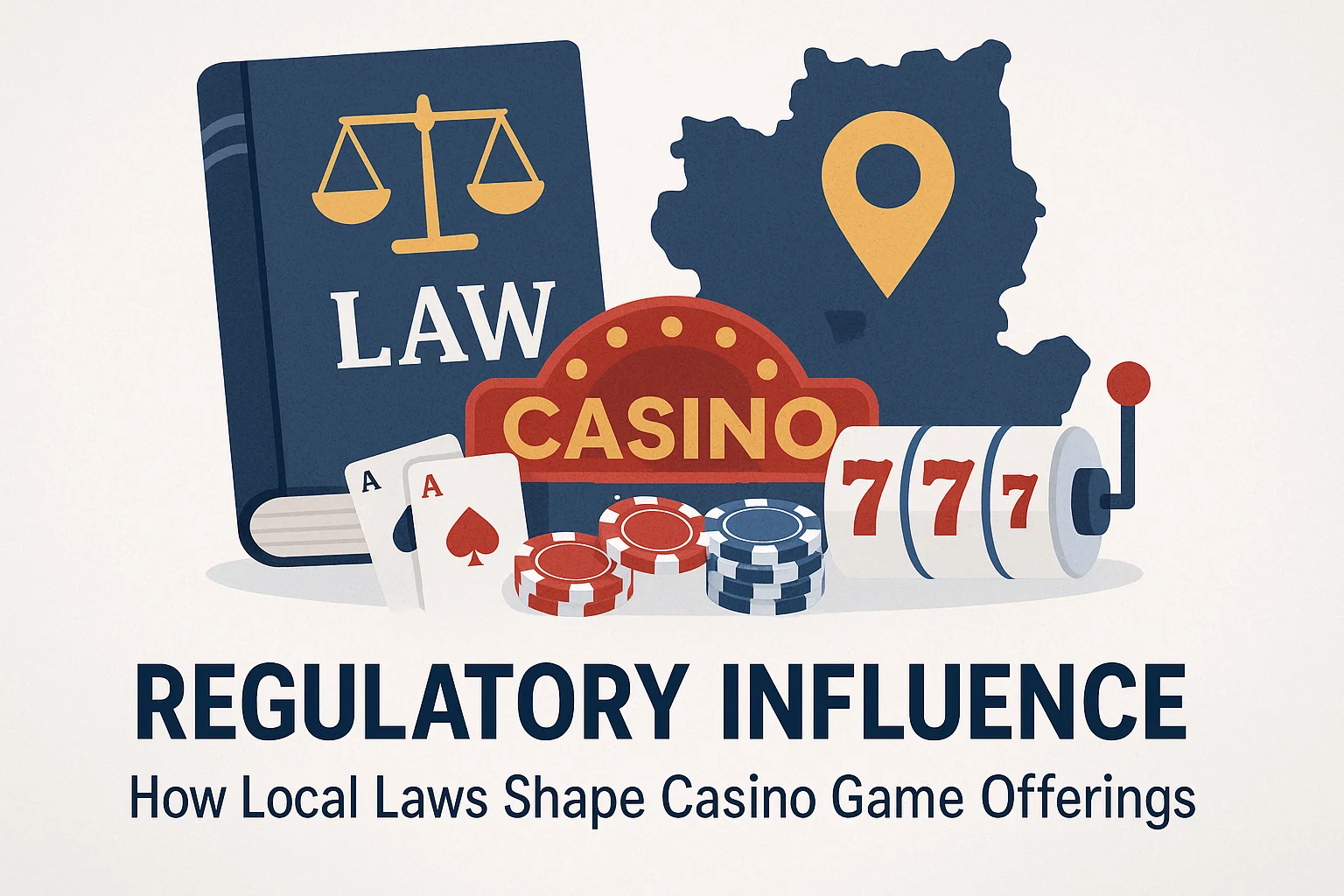Regulatory Influence: How Local Laws Shape Casino Game Offerings

The global casino industry has reached a critical juncture where regulatory frameworks no longer serve as mere compliance checkboxes but as fundamental architects of gaming experiences. With the global casino gambling market expected to reach $230.35 billion by 2029 at a 7.4% CAGR, the intricate relationship between local laws and game design has become the defining factor in market success.
The first half of 2025 alone witnessed $160.3 million in regulatory penalties across eight countries, involving over 40 enforcement actions. This dramatic escalation in regulatory scrutiny demonstrates how profoundly local laws now shape not just what games can be offered, but how they must be designed, marketed, and operated.
The Regulatory Transformation: From Oversight to Design Driver
Market Forces Driving Legislative Evolution
The modern regulatory landscape represents a fundamental shift from traditional oversight models to proactive market shaping mechanisms. Unlike previous decades where regulations primarily focused on licensing and basic consumer protection, today’s frameworks actively influence game mechanics, user interface design, and even the mathematical models underlying casino games.
The United States exemplifies this transformation through its state-by-state approach, where 34 jurisdictions now require comprehensive self-exclusion programs, 25 mandate deposit and time limits, and 31 enforce specific responsible gaming disclosures. These requirements don’t merely add compliance layers—they fundamentally alter how games are conceived and developed.
The Economics of Compliance Integration
Industry analysis reveals that regulatory compliance now accounts for 15-25% of total game development costs, a dramatic increase from the traditional 3-5% allocated for basic licensing requirements. This shift has created a new category of regulatory-driven innovation, where compliance features become competitive advantages rather than burdensome obligations.
Key Regulatory Categories Reshaping Game Development: • Responsible gaming mechanisms integrated into core gameplay • Anti-money laundering features affecting payment processing • Data protection protocols influencing user experience design • Regional content restrictions driving localized game variants
Regional Analysis: How Laws Shape Game Offerings
European Union: The Standardization Paradigm
The European Union’s fragmented yet coordinated approach has created a unique regulatory environment where individual member states maintain sovereignty while adhering to overarching consumer protection principles. The Gaming Regulators European Forum (GREF) facilitates cross-border cooperation, resulting in increasingly harmonized standards that operators must navigate.
Germany’s Interstate Treaty on Gambling, implemented in 2021, exemplifies how regulatory frameworks directly impact game design. The treaty’s specific requirements for online casino games have forced operators to modify traditional slot mechanics, implement mandatory spin intervals, and integrate real-time spending monitoring systems. These changes don’t simply add features—they reconstruct the fundamental gambling experience.
German Regulatory Requirements Affecting Game Design:
- Mandatory 5-second intervals between slot spins
- Maximum €1 stake limits per spin
- Real-time deposit and loss tracking systems
- Automated session break requirements
United States: The Patchwork Innovation Laboratory
The US market’s state-by-state regulatory approach has created a natural experiment in how different legal frameworks influence game development and market dynamics. Nevada’s focus on preserving brick-and-mortar casino interests has limited online casino gaming while permitting online poker, creating a unique market dynamic that influences game development priorities.
New Jersey’s progressive regulatory framework demonstrates the opposite effect, where comprehensive online gambling legalization has driven innovation in live dealer technologies, mobile gaming optimization, and integrated responsible gaming tools. The state’s operators report 40% higher player engagement rates compared to more restrictive jurisdictions, directly correlating regulatory flexibility with market performance.
Asia-Pacific: Cultural Integration Through Regulation
Asian markets present particularly complex regulatory landscapes where legal frameworks must accommodate diverse cultural attitudes toward gambling. Japan’s integrated resort regulations, implemented in 2018, create stringent operational requirements while attempting to balance tourism promotion with social responsibility concerns.
The regulations mandate that casinos occupy no more than 3% of integrated resort floor space, directly influencing facility design and game selection strategies. This constraint has driven innovation in high-value, compact gaming experiences and premium player-focused offerings.
Technical Implementation: How Regulations Drive Innovation
Responsible Gaming Technology Integration
Modern regulatory requirements have transformed responsible gaming from peripheral add-ons to core technical features. Advanced implementation includes real-time behavioral analysis systems that can detect problematic gambling patterns and automatically trigger intervention protocols.
Massachusetts regulations requiring “play management tools” have driven development of sophisticated player tracking systems that analyze betting patterns, session duration, and loss rates to provide personalized risk assessments. These systems represent significant technological advancement while serving regulatory compliance objectives.
Anti-Money Laundering: From Finance to Game Design
AML requirements have evolved beyond traditional transaction monitoring to influence fundamental game mechanics. The requirement for detailed transaction reporting has led to innovations in micro-transaction tracking, automated suspicious activity detection, and real-time compliance monitoring systems integrated directly into gaming platforms.
The UK’s enhanced due diligence requirements for transactions over £2,000 have prompted operators to develop sophisticated player verification systems that can seamlessly authenticate high-value transactions without disrupting the gaming experience.
Data Protection: GDPR’s Gaming Legacy
The implementation of GDPR and similar data protection frameworks has fundamentally altered how casino games collect, process, and store player information. These regulations have driven innovation in privacy-preserving analytics, decentralized data storage solutions, and transparent consent management systems.
Casino operators report that GDPR compliance has actually improved player trust and engagement, with transparent data practices becoming a competitive differentiator rather than a compliance burden.
Economic Impact Analysis: Regulatory ROI
Compliance Investment Yields Market Access
Despite increased compliance costs, data indicates that regulatory investment generates significant market access returns. Operators with comprehensive compliance frameworks report 35% higher market penetration rates and 28% better player retention compared to minimal-compliance competitors.
The correlation between regulatory excellence and business performance has created a new category of compliance-driven competitive advantage, where regulatory sophistication becomes a market differentiator.
The Penalty Paradigm Shift
The $160.3 million in regulatory penalties recorded in the first half of 2025 represents more than financial cost—it demonstrates how regulatory enforcement has become a market shaping force. Operators facing significant penalties report average market share losses of 15-20% in affected jurisdictions, creating powerful incentives for proactive compliance excellence.
Major 2025 Penalty Categories: • Responsible gaming failures: 45% of total penalties • AML compliance violations: 30% of total penalties • Data protection breaches: 15% of total penalties • Licensing requirement violations: 10% of total penalties
Emerging Regulatory Trends Shaping Future Offerings
Artificial Intelligence Integration Requirements
Emerging regulations in several jurisdictions are beginning to mandate AI-driven responsible gaming monitoring systems. These requirements represent the next evolution in regulatory influence on game design, where artificial intelligence becomes a required component rather than an optional enhancement.
Early implementations in jurisdictions like Ontario and New Jersey demonstrate how AI integration can enhance both player protection and operator efficiency while meeting regulatory objectives.
Blockchain and Transparency Mandates
Several emerging markets are implementing blockchain-based transparency requirements that mandate immutable game outcome records and provably fair gaming mechanisms. These requirements are driving innovation in decentralized gaming technologies and creating new categories of regulatory compliance tools.
Environmental and Social Governance (ESG) Integration
Progressive jurisdictions are implementing ESG requirements that influence everything from energy consumption in data centers to diversity requirements in game content. These regulations represent the expanding scope of regulatory influence beyond traditional consumer protection into broader social responsibility mandates.
Strategic Implications for Industry Stakeholders
Operator Adaptation Strategies
Successful operators are transforming regulatory compliance from cost centers to competitive advantages through strategic implementation approaches:
Compliance Innovation Framework:
- Early engagement with regulatory development processes
- Investment in predictive compliance technology systems
- Integration of compliance features into core product development
- Proactive stakeholder engagement and transparency initiatives
Technology Provider Opportunities
The regulatory transformation has created significant opportunities for technology providers specializing in compliance solutions. The market for regulatory technology in gaming is projected to grow at 25% CAGR through 2030, driven by increasingly sophisticated compliance requirements.
Player Experience Evolution
Modern regulatory frameworks are driving player experience improvements through enhanced transparency, better protection mechanisms, and more personalized responsible gaming tools. Industry data suggests that players increasingly prefer operators with robust regulatory compliance, viewing it as an indicator of reliability and trustworthiness.
Future Outlook: Regulatory Convergence and Innovation
International Cooperation Trends
The establishment of working groups on illegal gambling by the International Association of Gaming Regulators (IAGR) and memorandums of understanding between major industry associations signal increasing international regulatory cooperation. This trend suggests future harmonization of standards while maintaining regional customization capabilities.
Technology-Driven Regulatory Evolution
Emerging technologies are enabling more sophisticated regulatory approaches that can provide enhanced consumer protection while reducing compliance burden. Blockchain-based licensing systems, AI-driven monitoring, and real-time compliance verification represent the future of regulatory technology integration.
Market Consolidation Effects
The increasing complexity and cost of regulatory compliance are driving market consolidation, with larger operators acquiring smaller competitors to achieve compliance economies of scale. This trend is reshaping industry structure while creating opportunities for specialized compliance service providers.
Conclusion: Regulation as Innovation Driver
The evolution of casino industry regulation from basic oversight to sophisticated market shaping represents one of the most significant transformations in modern gaming. Rather than constraining innovation, well-designed regulatory frameworks are driving technological advancement, improving player experiences, and creating new categories of competitive advantage.
The $160.3 million in penalties recorded in early 2025 demonstrates the serious consequences of regulatory non-compliance, while also highlighting the substantial investments required for effective compliance management. However, industry data consistently shows that proactive regulatory engagement generates positive returns through enhanced market access, improved player trust, and competitive differentiation.
The future belongs to operators who view regulatory compliance not as a burden to be minimized but as an opportunity to be maximized. Those who successfully integrate regulatory requirements into their core value proposition will thrive in an increasingly sophisticated and regulated global marketplace.
As regulatory frameworks continue evolving to address emerging technologies, changing social expectations, and global cooperation initiatives, the casino industry stands at the threshold of a new era where regulatory excellence equals business excellence. The companies that recognize and embrace this transformation will shape the future of global gaming.
This analysis reflects current regulatory trends and industry data as of 2025. The rapidly evolving nature of both regulation and technology requires continuous monitoring and adaptation of compliance strategies.
